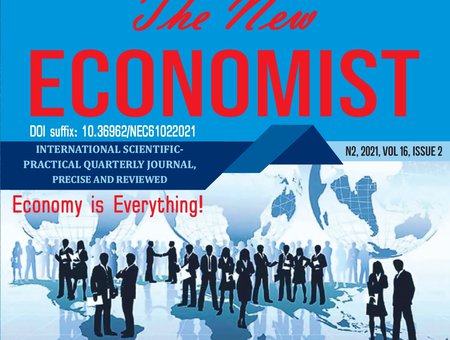Institutional Evolution of Higher Education in Georgia / საქართველოს უმაღლესი განათლების ინსტიტუციური ევოლუცია

Shota Veshapidze / შოთა ვეშაპიძე
Doctor of Economic Sciences, Ivane Javakhishvili Tbilisi State University, Associate professor, Georgia / ეკონომიკურ მეცნიერებათა დოქტორი, ივანე ჯავახიშვილის თბილისის სახელმწიფო უნივერსიტეტი, ასოცირებული პროფესორი

Gia Zoidze / გია ზოიძე
Doctor of Economics, Batumi Shota Rustaveli State University, Batumi State Maritime Academy, Invited Lecturer, Georgia / ბათუმის შოთა რუსთაველის სახელმწიფო უნივერსიტეტი, ბათუმის სახელმწიფო საზღვაო აკადემია, მოწვეული ლექტორი, საქართველო
Abstract
Education policy is an important direction of Georgia's security policy, of which higher education is an integral part. Institutions occupy an important place in its development. Regulatory norms, institutions, values, cultural patterns, forms of ownership are recognized directions for establishing progress in the education system, its arrangement and institutionalization.
In conditions when there is no orderly, social protection-oriented system, as well as any clearly defined priorities, all forms of discrimination in the labor system in the education system are excluded by the Georgian legislation. In this field, sufficient experience has been accumulated in public and private higher education institutions of Georgia. This approach was developed by the adoption of the Organic Law of Georgia on the Labor Code of Georgia.
Georgia needs the development of institutions that will enable us to effectively realize the potential of the higher education system. It is also important to implement long-term education reform, which is openly supported by the World Bank.
Introduction
განათლების პოლიტიკა საქართველოს უსაფრთხოების პოლიტიკის მნიშვნელოვანი მიმართულებაა, რომლის შემადგენელი ნაწილია უმაღლესი განათლება. მის განვითარებაში მნიშვნელოვანი ადგილი უჭირავს ინსტიტუტებს. მარეგულირებელი სამართლის ნორმები, დაწესებულებები, ფასეულობები, კულტურული ნიმუშები, საკუთრების ფორმები, განათლების სისტემაში პროგრესის დამკვიდრების, მისი მოწყობის და ინსტიტუციონალიზაციის აღიარებული მიმართულებაა.
ისეთ პირობებში, როდესაც არ არსებობს მოწესრიგებული, სოციალურ დაცულობაზე ორიენტირებული სისტემა, ასევე, რაიმე ნათლად გამოკვეთილი პრიორიტეტები, საქართველოს კანონმდებლობით გამოირიცხა დისკრიმინაციის ყველა ფორმა განათლების სისტემაში შრომით ურთიერთობებში. საქართველოს სახელმწიფო და კერძო უმაღლეს სასწავლებლებში ამ მიმართულებით საკმაო გამოცდილება დაგროვდა. ეს მიდგომა განავითარა საქართველოს ორგანული კანონის საქართველოს შრომის კოდექსის მიღებამ.
ამასთან, საქართველოს სჭირდება ინსტიტუტების განვითარება, რაც მოგვცემს უმაღლესი განათლების სისტემის პოტენციალის ეფექტიან რეალიზებას. მნიშვნელოვანია, აგრეთვე, განათლების გრძელვადიანი რეფორმის განხორციელება, რასაც ღიად უჭერს მხარს მსოფლიო ბანკიც.
References:
- Sichinava, A., Chikava, M., Veshapidze, S., Sekhniashvili, D., Pailodze, N., (2013). Realities of internationalization of higher education in Georgia. PRADEC Conference. Internationalisation in Higher Education: Evaluating concepts, challenges and strategies, 25-26 April, 2013 Proceedings Volume 2 | Issue 1 | August 2013 |pp.95-98
- Veshapidze, S., Zubiashvili, T., (2020). About the Origins of Modern Geoeconomic Foundations of Georgia. Ecoforum Journal 9 (2).
- Veshapidze, S., (2017). THE TRADITIONS ORIENTATED ON EUROPEAN VALUES IN GEORGIA. Sciences of Europe. VOL 4, No 13 (13)
- Veshapidze, Sh., Karalashvili, Sh., (2018). Pension Reform in Georgia. Refereed International Journal Ecoforum. Vol. 7. №2.
- Veshapidze, S., Darbaidze, M., Beridze, T., (2016). Euro-Atlantic values: what tie up us. Universal. pp. 230-235.
- Veshapidze, S., (2020). Religion and national values in Georgia. International Scientific Collection, Volume 3, pp. 33-36.
- Veshapidze, S., Mchedlishvili, Z., (2020). From Ilia Chavchavadze’s Economic Views: Competition, Private Property and International Trade. Ecoforum Journal 9 (2).
- Veshapidze S., Babuadze N., Beridze T., EUROPEAN VALUES AND CHOICE OF GEORGIA (HUMAN DIGNITY, LAWFUL SOVEREIGNTY, DEMOCRACY AND WELLBEING). ACTUAL PROBLEMS OF SUSTAINABLE DEVELOPMENT OF NATIONAL ECONOMIES. (10-11 July, 2015). PUBLISHING HOUSE OF PAATA GUGUSHVILI INSTITUTE OF ECONOMICS OF IVANE JAVAKHISHVILI TBILISI STATE UNIVERSITY. Tbilisi, 2015, pp. 79-83.
- Zoidze, G., (2021). Basic Paradigms of Institutional Economics. Universali, Tbilisi. p. 202
- Zoidze, G., (2020). GEORGIAN AGRO-SPHERE DEVELOPMENT PRIORITIES AND WAYS OF CARRYING OUT SOME IMPROVEMENTS. Myśl Ekonomiczna i Polityczna, (2 (69)), 55-71. DOI: 10.26399/meip.2(69).2020.10/g.zoidze
- Zoidze, G., (2020). Risks Caused by Pandemics and Anti-crisis Management. Ivane Javakhishvili Tbilisi State University, Paata Gugushvili Institute of Economics, Proceedings of Materials of International Scientific Conference Dedicated to the 115th Birth Anniversary of Academician Paata Gugushvili, 190-195
- Galt & Taggart, Education Sector in Georgia. Georgia Education, Sector Review July 28, 2020. Bochorishvili E., Peranidze N. (In Georgian) Available at: https://galtandtaggart.com/upload/reports/14673.pdf (Accessed: 1st July 2021).
- International Bank for Reconstruction and Development / World Bank, 2020. Survival, Learning, Prosperity: A Strategic Investment in Human Capital for Georgia’s Potential Development. (In Georgian) Available at: https://documents1.worldbank.org/curated/en/217471597681506927/Survive-Learn-Thrive-Strategic-Human-Capital-Investments-to-Unlock-Georgias-Potential.pdf (Accessed: 1st July 2021).
- Legislative Herald of Georgia, Convention for the Protection of Human Rights and Fundamental Freedoms. (In Georgian) Available at: https://matsne.gov.ge/ka/document/view/1208370?publication=0 (Accessed: 1st July 2021).
- Legislative Herald of Georgia, International Covenant on Economic, Social and Cultural Rights. (In Georgian) Available at: https://matsne.gov.ge/ka/document/view/1483577?publication=0 (Accessed: 1st July 2021).
- Legislative Herald of Georgia, European Social Charter (Revised) Strasbourg, 3.V. 1996 (in Georgian) Available at: https://matsne.gov.ge/ka/document/view/1392164?publication=0 (Accessed: 1st July 2021).
- Legislative Herald of Georgia, Law of Georgia on Higher Education. (In Georgian) Available at: https://matsne.gov.ge/ka/document/view/32830?publication=85. (Accessed: 1st July 2021).
- Legislative Herald of Georgia, Organic Law of Georgia Labor Code of Georgia. (In Georgian) Available at: https://matsne.gov.ge/document/view/1155567?publication=10 (Accessed: 1st July 2021).
- Legislative Herald of Georgia, Constitution of Georgia. (In Georgian) Available at: https://matsne.gov.ge/ka/document/view/30346?publication=36 (Accessed: 1st July 2021).
- Ministry of Education and Science of Georgia, project “Innovation, Inclusive Education and Quality”. (In Georgian) Available at: https://mes.gov.ge/content.php?id=10452&lang=geo (Accessed: 1st July 2021).
- Society and banks, education for economic growth. (In Georgian) Available at: http://sab.ge/ge/news/880-ganatleba-ekonomikuri-zrdistvis (Accessed: 1st July 2021).
- UN, Universal Declaration of Human Rights, 60th Anniversary, Special Edition 1948-2008. (In Georgian) Available at: http://www.supremecourt.ge/files/upload-file/pdf/aqtebi3.pdf (Accessed: 1st July 2021).
- United Nations General Assembly Resolution A / RES / 70/1 of 25 September 2015 - “Transforming Our World: A 2030 Agenda for Sustainable Development”. (In Georgian) Available at: https://undocs.org/A/RES/70/1 (Accessed: 1st July 2021).
References
The New Economist N2, (2021), Vol 16, Issue 2

11/07/2021
Copyright (c) 2021 Shota Veshapidze / შოთა ვეშაპიძე, Gia Zoidze / გია ზოიძე

This work is licensed under a Creative Commons Attribution-NonCommercial-NoDerivatives 4.0 International License.
